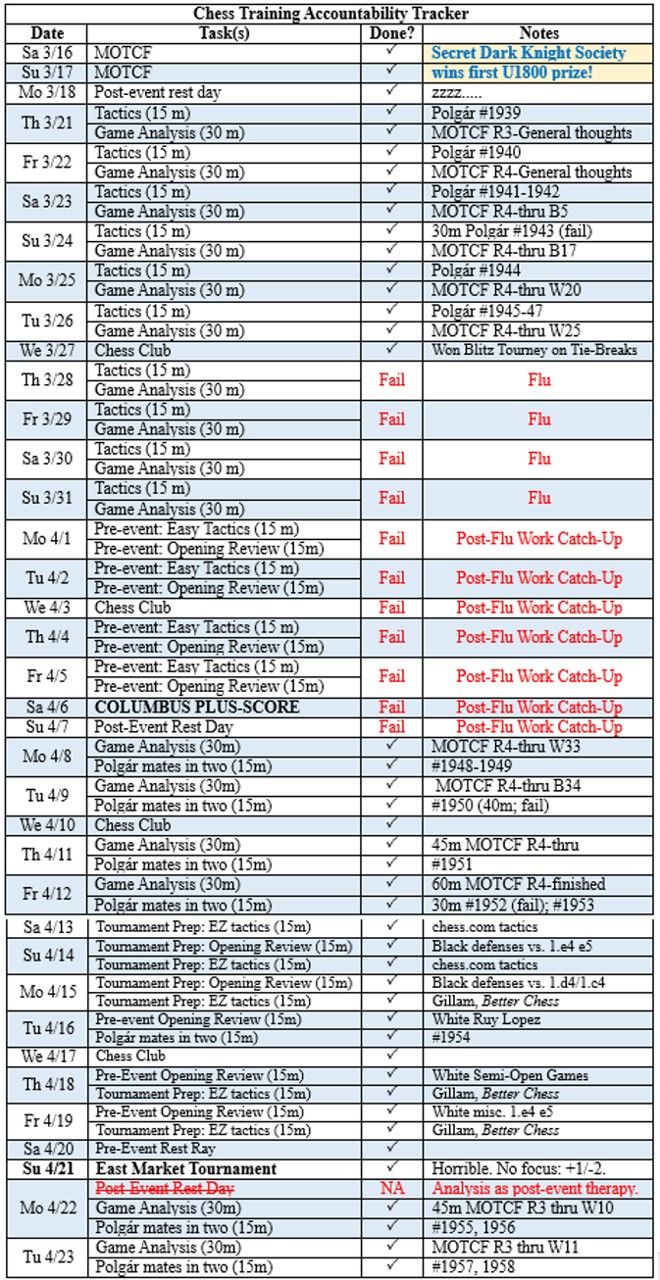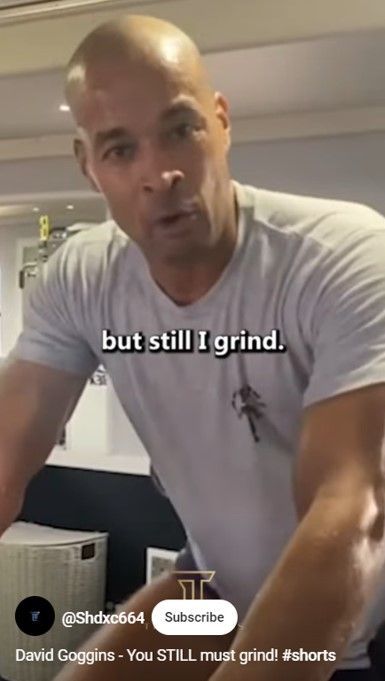
Failure, Self-Perception, and Grinding (or "Ode to David Goggins")
A recent set-back got me thinking about how best to deal with failure, and in particular how not to spiral into self-blame and abuse. So don't worry, this is not a self-punishment post, but rather a post about how I'm avoiding that sort of thing these days (so hang on to the end when I get to the solution part).
Last weekend I had a terrible tournament. I was simply unable to focus all day. I could see that I wasn't focusing. Try as I might, I could not force myself to focus. In mid-game, I could feel my own inability to focus. I was consciously aware of it. And I could not change it one bit.
So I went 1/3 in the event. I won the first round against an opponent rated roughly 1000 points below me. I lost round two vs. a 2100 in a game where, on my next-to-last move, I simultaneously hung my queen and a mate in two; my opponent ignored the queen and took the mate; even after getting mated, I still didn't see that my queen was hanging until our post-game discussion. In round three I blundered a pawn out of the opening against an 1100, who proceeded to take the material and the initiative and never relented, slowly, steadily driving me back until again, mate was inevitable.
I'm not entirely sure the failure began on the day of the tournament though. Here's my training log between last tournament and the previous one.

One of the things you'll notice (if you've looked at my training logs previously), is that I had the longest streak ever of skipped training days shortly before the tournament. Of course, it could just be that I was off form last Sunday. But I suspect it was not just that. And having my single largest training failure of the past four years must factor into things to some degree as well. My largest training failures to date have generally been no more than maybe two days, tops, for illness, work, whatever. This one lasted nearly two weeks—longer even than my lapse during my bout with COVID last summer, which lasted only four or five days.
One can always try to blame things on life circumstance and argue that yes, I was sick for several days, or that yes, work had piled up that I needed to get done, and that prevented me from doing proper training (and in fact prevented me from going to a tournament I had planned to participate in). But in the end we all know that's not true. Well, I know that's not true. The reality is, lapses in training are always a choice. There's no reason on any given day in that period (especially in the post-illness days), that I couldn't have found thirty minutes—or in the worst-case scenario, at least fifteen minutes—to do some training. But I did not. And there is no one else to blame for that but me.
Needless to say, the tournament failure, and the fairly direct link to self-blame due to my lapse in training, could easily have set me into a downward spiral of self-flagellation and abuse. It did not, and here is why.
I've been reading and watching a lot of David Goggins the past few months. In a way, he's kind of become an unofficial "second sensei" for me (only indirectly by way of reading and listening to him on videos).
(Click image to play, or click here)
"I fail at most things I do—but still I grind." – David Goggins
What I realized after my failure this past weekend is that the solution to failure is simple. Get back to "grinding." Now. Not tomorrow. Today.
What Goggins calls "grinding" is what is known in the Chess Dojo as "sweat-work."
Normally I take a rest day after any tournament to recharge. Sometimes I take two. It's useful. But in this case, I was feeling so down on myself that dealing with the failure became the priority. So, no rest day. Instead of a rest day, I immediately went back to sweat-work, both on the chess board and in the home gym. A solid hour of grinding at chess, and a solid hour of grinding push-ups, crunches, and dumbbell work. The next day the same (only on the physical side I swapped out the strength training for a run).
I felt better immediately.
Why? Because, again to paraphrase Goggins: "Nobody cares what you did yesterday. What are you doing today?" Another important mantra, both in times of failure and in times of success.
Sunday night when I got home from the tournament, I was a worthless patzer. Monday, by jumping immediately back into the grind of sweat-work, I became a chess player again. Yesterday is done. All that matters is getting back to work today and doing what needs to be done to play the best chess possible. And then it's possible to once more look in the mirror.
My next tournament is just nine days from today, on May 4. Will I have a good day or a bad day then? I don't know. But what I do know is that between now and then I will grind, and grind, and grind, relentlessly. No excuses, no blame, no regrets. There is reassurance, growth, and no small measure of pride and self-respect to be found in that.
